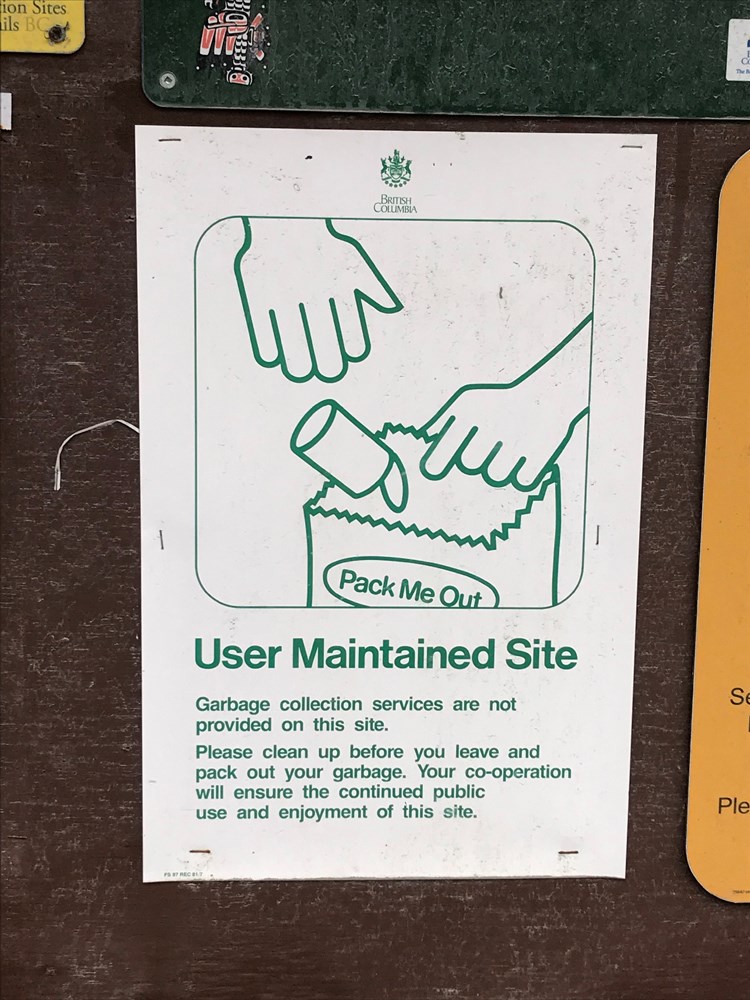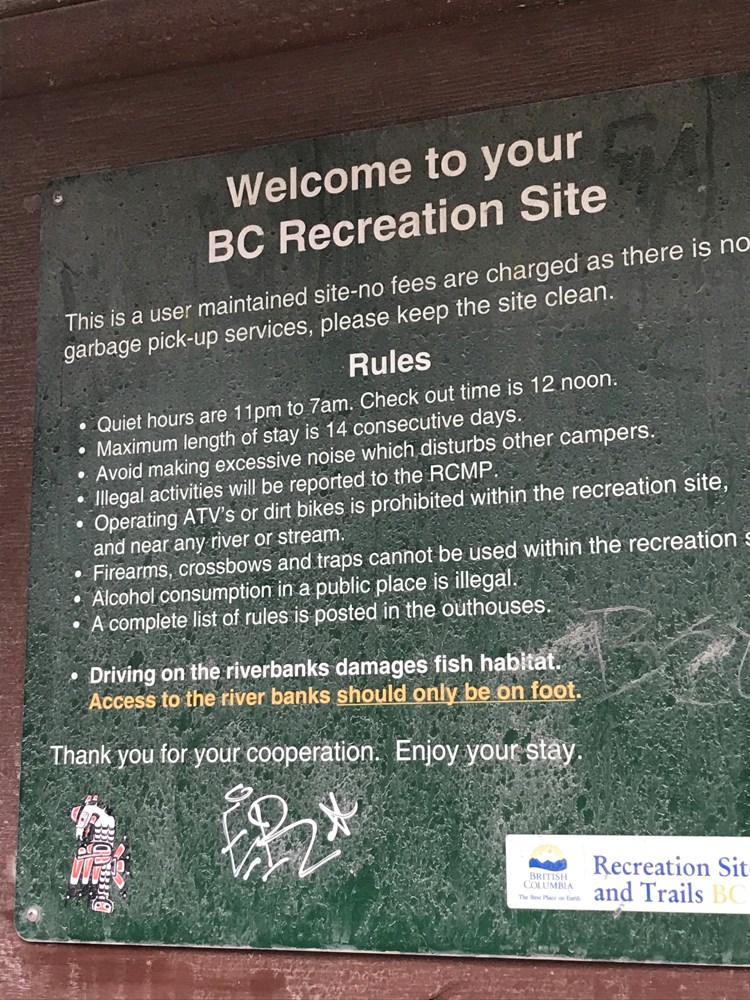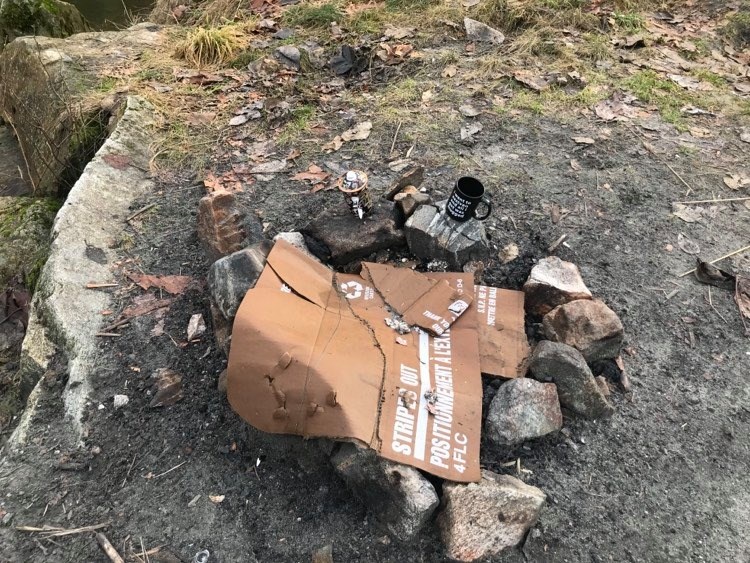Being lapped by Squamish River waves is human feces, covered with baby wipes.
Metres away, a makeshift fire pit includes two mugs and wet cardboard. Next to the pit are two beat-up walking poles, a child's fishnet and a glove.
On the sand are cigarette butts and beer can tops. A rope is wrapped around a boulder. Another rope hangs from the nearby tree.
This is the scene at the Squamish River Campsite, in the Squamish Valley, on a cloudy January Sunday morning, during the pandemic.
This is not a long weekend summer scene.
And it is a situation repeated throughout the backcountry in Squamish.

There are provincial government signs warning people that garbage is not picked up at this campsite, which is free and part of the user-maintained Recreation Sites and Trails network. This means it doesn't fall within the boundary of the BC Parks and Protected Areas system.
Other signs encourage leaving no trace.
But it isn't happening, and this isn't a new problem.
Locals have complained about it for years, not just in the Squamish Valley, but in various parks and sites throughout the corridor.
What can be done?
West Vancouver-Sea to Sky MLA Jordan Sturdy told The Chief that the idea of taking out what you bring in seems to have left the public consciousness.

"When I was first going out in the backcountry, it was, 'take only photographs, leave only footprints, and is an ethic that seems to have dissipated over the decades," he said.
"There's a lot more people now who are urbanites who don't really appreciate what it is like to live and spend time outside areas that are managed by people."
Sturdy added that expectations can be set too.
"I believe education has got to be Number 1," he said, adding more clear signage might help.
"We have to remind people. We have to make it socially unacceptable to litter or worse."

Sturdy acknowledged it may be naive of him to think people will change with further understanding.
He also pointed to plans under the previous Liberal government to put in more ministry campsites.
"And consolidate it so that it brings the impact to smaller footprints that are identified as such, that have some of the services that are necessary."
With more sites, you don't have people going everywhere, but they are focused in sites with other people around.
"When you are out in the boonies somewhere and nobody is around and you drink beer and light fires and shoot your gun off. But if you are in a forestry campsite with other people around, people hopefully act a little more responsibly."
Sturdy said the plan at one point was for approximately 200 sites in the Squamish Valley region, but that hasn't materialized.
"I don't know where that is on the work planning anymore. It just seems to have faded away in the last couple of years, but I think it is important."
He said over the summer at his farm in Pemberton, which has a restaurant and store, he met people who were flocking to the area and who had never been through the Sea to Sky before.
"There is just so much more to see and do up here. There's no question there are going to be more people coming up here," he said.
"We need those campsites."
Sturdy added that more Conservation Officer Service staff and natural resource rangers are necessary too.
According to the Ministry of Environment and Climate Change Strategy, BC Parks has three full-time senior ranger positions and 11 seasonal park ranger positions in the Sea to Sky region. Two student ranger crews are assigned to the South Coast to complete projects in parks throughout the region, including at Alice Lake and Porteau Cove parks.
Sturdy also stressed a co-ordinated approach to enforcement with the RCMP, COS, and park rangers works well.
"You also need a presence out there," he said.
He would also like to see more funding for BC Parks, which had a $2-million cut last year.
"Hopefully, we will see that restored, plus more."
In response to Sturdy's assertions, a spokesman for the Ministry of Environment and Climate Change Strategy told The Chief that it is investing in parks and working to find solutions in the Sea to Sky.
"More people than ever are discovering and enjoying our world-class park system. We are taking care of our provincial parks through new investments and are committed to finding solutions in response to the exceptional growth in visitors at our popular parks, such as those along the Sea to Sky Corridor," the ministry spokesperson wrote in an email to The Chief.
The spokesperson said that BC Parks invests about $18 million annually into improvements to existing facilities, which includes more than $4 million dedicated last year to campsite expansions.
He added that in the last three years, 1,205 new campsites have been added to provincial parks and recreation sites throughout the province and more are being added this season.
BC Parks and Recreation Sites and Trails BC have increased the number of sites within the Squamish area, the spokesperson added.
"BC Parks recently announced investments at Alice Lake Provincial Park, including the Four Lakes Trail parking lot being expanded, universally accessible pit toilets being installed, along with a communal bear-safe food storage locker to service the 12 campsites for tenting."
Upgrades at Porteau Cove Provincial Park, were also noted.
"In addition, more than 45 provincial parks in the Lower Mainland, Sea to Sky and Sunshine Coast areas will have upgrades to bear-proof recycling and waste bins to better protect wildlife."
The spokesman also referenced a pilot project that is underway in other communities with the goal of expanding to the Sea to Sky area.
"In partnership with the BC Parks Foundation, BC Parks is currently piloting the Discover Parks Ambassador program to bring paid employees and volunteers into parks to provide public outreach, interpretation, citizen science and more."



